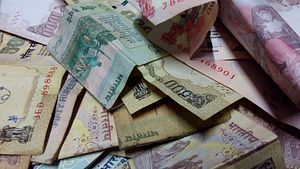For most part, the Sustainable Development Goals (SDGs) – the global 2030 development agenda – are oriented towards securing human rights for populations across the world. While the world stands at a crossroads and faces challenges each more threatening than the last, the SDGs are a universal call to end poverty, protect the planet, and to ensure that all people enjoy peace and prosperity. However, financing the lofty targets set forth in the SDGs remains a significant challenge, especially for developing countries. Though estimates of financing gaps vary greatly, projections for the alleviation of poverty stand between $66 billion annually to $5 to $7 trillion globally, whereas investment gaps stand at $2.5 trillion a year.
The Third International Conference on Financing for Development – a broad framework agreed upon by the international community to finance the SDGs – preceded the adoption of the 2030 development agenda and put the onus of financing the SDGs primarily on domestic resource mobilization or national taxation, along with investment and private financing. In this regard, the role of the state with regard to mobilizing domestic resources is integral to public provisioning, social security, financing development, reducing inequality and for the progressive realization of human rights.
However, economic, sociopolitical and developmental realities differ pointedly from international commitments made by countries in Asia. The neoliberal development model chosen by most Asian countries since the 1980s is geared towards achieving rapid and high economic growth based on trade and investment liberalization, privatization, and most importantly, a rolling back of the state.
With the exception of Japan and South Korea, the regional tax-GDP ratio for Asia stands at about 18 per cent – the lowest in the world. Further, Asian tax systems are also highly regressive, with a steady reduction in corporate tax rates and a substantial dependence on indirect, consumption taxes such as VAT and GST which impacts the redistributive function of taxation, as indirect taxes are indiscriminate in nature and ignore the ability of an individual to pay taxes. This leads to high levels of income and wealth inequality; and as studies reveal, Asian societies are some of the most unequal in the world with more than half the total wealth pool being owned by the top 1 per cent of the population in Russia, India, Thailand and Indonesia.
Developing Asian countries also look towards creating the reputation of business-friendly nations in order to attract foreign investment. As Asian economies reduce their corporate tax rates, it creates artificial tax competition among them, until nations are engaged in a ‘race to the bottom’ in an attempt to underbid each other in lowering taxes and regulation. Furthermore, countries in Asia offer massive tax exemptions and tax holidays hoping to attract, incentivize or retain investment in their respective countries and generate employment, which often involve foregoing revenue from certain industries or sectors for several years. However, the costs associated with tax exemptions have been known to outweigh the expected returns and corrode the tax base of already cash-strapped developing countries. Studies also show that general economic and framework conditions and the presence of large markets are far more important considerations for foreign investors rather than the availability of tax exemptions.
Financial opacity and secrecy are on the rise in Asia too. Hong Kong and Singapore are well known tax havens or secrecy jurisdictions on the continent, together offering a large and growing share of offshore financial services. In addition, more and more Asian countries are setting up onshore tax havens in the form of international financial services centers (IFSCs) within their jurisdictions, which promote financial speculation and illicit financial flows (IFFs). Asia is the most severely impacted region by the issue of IFFs – funds generated through a range of activities including tax evasion, misappropriation of state assets, laundering proceeds of crime, corruption as well as tax dodging and tax avoidance by multinational corporations and the elite by abusing domestic tax laws, bilateral or multilateral tax treaties, trade and investment agreements. Due to their clandestine nature, IFFs are able to maneuver from one jurisdiction to another, using secrecy hubs as conduits, to finally end up in influential financial centres in the Global North. Aided by an efficient industry of tax lawyers, bankers and accountants who enable such activities, IFFs remain hidden from state authorities. IFFs widen financing gaps and prevent the immediate and progressive realization of human rights, especially in developing countries.
These issues, though seemingly disjointed, are complex and interconnected. One of the key ways in which this can be addressed is through international cooperation on tax matters between countries in Asia and the Pacific. There has been significant research on the proposal of setting up a pan-Asian tax cooperation forum under the auspices of the United Nations Economic and Social Commission for Asia and the Pacific (UNESCAP), including a proposal by the UNESCAP Secretariat.
As ESCAP’s Seventy Fourth Session is being held between May 11 and 16, 2018, with inequality in Asia and the Pacific as the main theme of the Ministerial Segment, it is imperative that governments of Asia-Pacific countries recognize that domestic resource mobilization, progressive tax systems, and curtailment of illicit financial flows lie at the heart of development, reducing economic and gender inequalities as well as the progressive realization of human rights; along with the successful implementation of the Sustainable Development Goals. For far too long, Asia has viewed tax as a cost to a company, or a burden on an individual. The redistributive nature of taxation must be recognized for development to be sustainable and societies to be equitable.
Neeti Biyani works with Centre for Budget and Governance Accountability in New Delhi, India on issues of tax and development, illicit financial flows, and financial transparency.

































